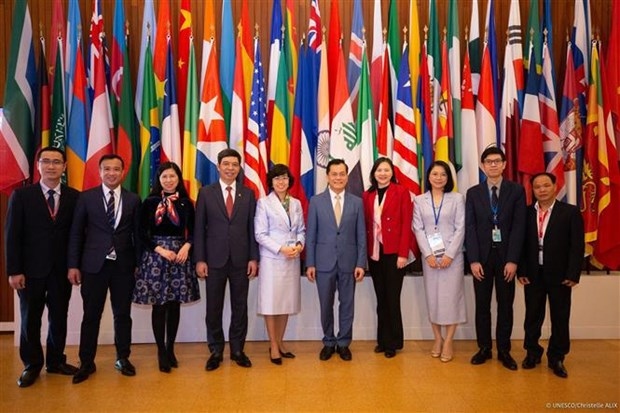
Deputy Minister of Foreign Affairs Ha Kim Ngoc made the statement at the 219th session of the UNESCO’s Executive Board which was held in Paris on March 18 and March 19.
Deputy Minister Ngoc, who is also chairman of the Vietnam National Commission for UNESCO, stated that the world is now in a difficult time and is facing many intertwined challenges such as the climate and an environmental crisis, the rapid development of artificial intelligence (AI), increasing inequality, violence, and armed conflicts, all of which has impacted aspects of social life.
Amid this context, multilateralism and international co-operation based on openness, equality, and mutual benefit, as well as UNESCO's mission to promote peace through dialogues, mutual understanding, and its pioneering role in strengthening global co-operation in education - training, culture, heritage, science - technology, and information - communication, are becoming more important than ever, he emphasized.
The Vietnamese representative applauded the efforts made by UNESCO’s director-general and secretariat, as well as the group’s members in promoting interdisciplinary and multi-sector approaches, diversifying resources, and expanding the global partnership network to further strengthen the role and effectiveness of the organisation.
Deputy Minister Ngoc proposed UNESCO and its executive board continue realizing initiatives, programmes, and activities to carry out the Sustainable Development Goal (SDG) No. 4 aimed at ensuring equitable quality education and promote lifelong learning opportunities for all, while also seeking to strengthen the efficiency of the Global Network of Learning Cities, UNESCO Associated Schools Network and UNESCO Creative Cities Network.
Meanwhile, it remains essential to associate culture and heritage with sustainable development, promote open science and ethics in AI, strengthen biodiversity conservation, water security, ocean governance, and climate change response, contribute to the UN Summit of the Future (slated for September), and support member countries in implementing the SDGs, he suggested.
On this occasion, the Vietnamese diplomat held working sessions with Audrey Azoulay, director-general of UNESCO; Xing Qu, deputy director-General UNESCO; Vera Khoury Lacoeuilhe, president of the UNESCO Executive Board; Simona-Mirela Miculescu, president of the UNESCO General Conference; Anthony Ohemeng-Boamah, assistant director-general for Priority Africa and External Relations of UNESCO; and Lida Brito, assistant director-general for Natural Sciences of UNESCO; as well as heads of delegations from some member countries to promote bilateral and multilateral ties.
Deputy Minister Ngoc also worked with Lazare Assomo, director of the UNESCO World Heritage Centre, and Regina Durighello, director of ICOMOS World Heritage Advisory and Monitoring Unit, to discuss the enhancement of co-operation in protecting and promoting the values of world heritages in Vietnam.
At the working sessions, the UNESCO leaders and heads of delegations of countries hailed the fruitful linkages that exist between Vietnam and UNESCO and other member countries, as well as important and effective Vietnamese contributions to the common affairs of the organization in its capacity as a member of five key management mechanisms of the group.
They highlighted Vietnam as a model for harmony between preservation and promotion of heritages in association with promoting tourism development, economic growth, and people’s livelihoods.
Deputy Minister Ngoc expressed his hope that the UNESCO leaders and the secretariat of UNESCO will provide consultancy and support new Vietnamese heritage dossiers such as those of the Yen Tu - Con Son - Kiep Bac landscape and relic complex, the Oc Eo - Ba The archaeological site, Con Moong cave, and intangible cultural heritages such as the Festival of Ba Chua Xu Goddess at Sam Mountain, Dong Ho folk painting art and Lang Son global geopark.
The nation also aspires to receive support in preserving and promoting the value of UNESCO-recognized world heritage sites, including the project to preserve, restore, and promote the value of the Imperial Citadel of Thang Long – Hanoi, Deputy Minister Ngoc said.
The leaders of UNESCO and ICOMOS pledged to support the country in building and promoting heritage dossiers proposed by the chairman of the Vietnam National Commission for UNESCO.
The Vietnamese Deputy Minister also used this occasion to invite and convey invitations to the UNESCO leaders to visit the nation for the celebrations of 10 years since Trang An Landscape Complex which was recognized as a World Cultural and Natural Heritage Site in April, the Festival for Peace 2024 in July, and the eighth Asia Pacific Geoparks Network Symposium in September.





